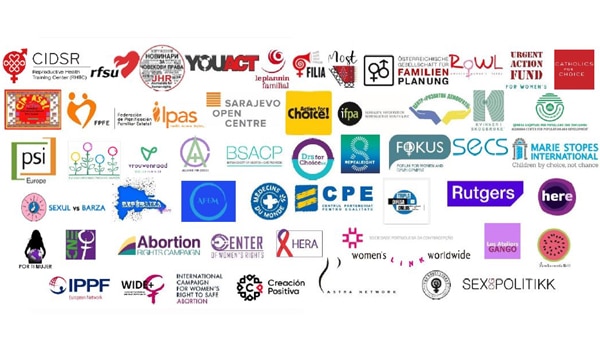
The European Safe Abortion Networking Group is a group of national, regional and international SRHR organisations based in Europe, working for universal access to safe, legal abortion.
The Covid-19 pandemic has highlighted the differential access to safe and legal abortion across Europe since March 2020. Lockdowns have confined women to their homes and borders have been closed, making it difficult for women living in countries with restrictive laws to cross a national border to find a legal abortion, while access to in-person, hospital-based abortion care has become considerably more difficult to find and arrange in many countries.
This has been and remains a rapidly changing scenario, and European countries have responded in very different ways. In Poland, Lithuania and Malta, for example, the pandemic has exposed the perversity of restrictive abortion laws. There have been statements by politicians discouraging women from seeking abortions. The risk of infection with Covid-19 in clinical/hospital settings, e.g. during mandatory counselling or ultrasound scans, having to collect abortion pills in person, and hospitalisation for abortion care, has not been addressed. In some cases, the pandemic has become an excuse for unwilling doctors not to provide abortions at all, e.g. by describing abortion as “non-essential”, “non-emergency” or “routine” care.
In contrast, the Scandinavian countries, Belgium, Netherlands and Portugal have ensured continuing access to safe abortion services, undisrupted by the pandemic. Some countries went even further. To reduce the risks related to in-person care, Ireland first, then Britain and France introduced regulations enabling the use of telemedicine for arranging and following up self-managed abortion at home for first trimester medical abortions – but only for the duration of the pandemic. Germany, which requires mandatory counselling before abortions, allowed this to take place over the phone or by video call. Catalonia in Spain reduced the number of required pre-abortion visits from two to one. Italy recently introduced some changes too, but the parameters remain unclear. However, some of these countries are unfortunately already reverting to pre-pandemic regulations.
There is great uncertainty regarding the future spread and consequences of Covid-19. Regardless of the pandemic, however, in most countries in Europe, even liberal laws and policies are outdated regarding how, where, by whom and with whose permission abortion care can be provided, let alone on what grounds, how late in pregnancy, and with what legal and criminal restrictions and regulations. Moreover, self-managed abortion at home with abortion pills, which has been shown to be safe in the first trimester of pregnancy, is not permitted by law in most if not all countries.
We say it is time to bring abortion laws, policies and services into the 21st century.
A call to improve access to safe, legal abortion in every country in Europe
On the occasion of International Safe Abortion Day, 28 September 2020, we the undersigned call on policymakers in every European country to take responsibility for removing restrictions on safe and legal abortion in your country, in line with World Health Organization (WHO) guidance, as follows:1. Recognise abortion as essential, time-sensitive healthcare.
2. Guarantee access to safe, legal abortion, with particular attention to under-served and vulnerable populations, and with as little disruption as possible in times of crisis.
3. Allow self-managed abortion with pills at home in the first trimester of pregnancy.
4. Support the use of telemedicine when appropriate, to arrange abortions and for follow-up, including 24-hour support for those who self-manage abortion at home.
5. Make aspiration abortions available at outpatient or primary-level facilities, provided by trained mid-level providers (and during the Covid-19 pandemic in line with agreed protocols for prevention of risk in healthcare settings).
6. Allow second trimester medical abortions to take place in outpatient clinics, managed by mid-level providers, with specialist back-up as required. This will remove the need for operating theatre conditions or a gynaecologist in the great majority of cases.
7. Train GPs, nurses and midwives to arrange and provide abortions as appropriate to meet demand and to ensure a sufficient number of willing providers. Denial of care by healthcare professionals, e.g. due to their personal beliefs, must not delay or restrict women’s right to access abortion care.
8. Train pharmacists and appropriate pharmacy staff to provide medical abortion pills over the counter and by post to women for use at home.
9. Simplify abortion regulations, removing all medically unnecessary requirements, so as to facilitate access to abortion without delay.
10. Decriminalise abortion, including in the second trimester of pregnancy, and also in the rare cases after the second trimester if the woman’s life, health and well-being would be adversely affected if she were forced to continue the pregnancy.
In short, ensure that no one is forced to continue a pregnancy against their will.



